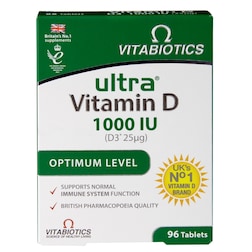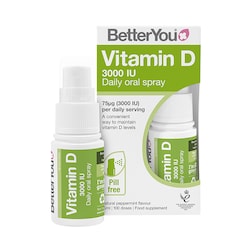15% off £30
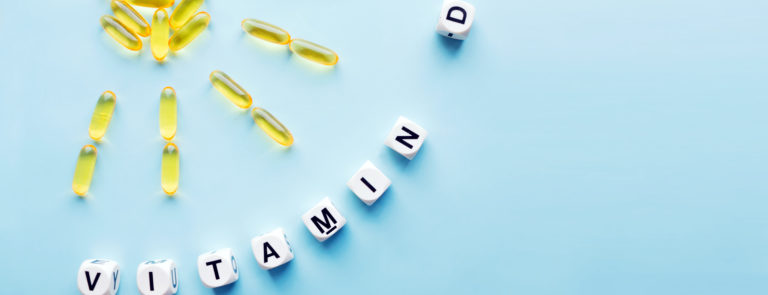
The best sources of Vitamin D: are you getting enough?
- Health Hub Home
- Vitamins & Supplements
- Vitamins
- Vitamin D
- The best sources of Vitamin D: are you getting enough?
Are you getting enough Vitamin D every day? In fact, thinking about it, how much is ‘enough?’ Before we delve deeper into the ins and outs of Vitamin D, let’s spend a minute or two focusing on what it is, the main sources of Vitamin D and what it does to our body.
What is Vitamin D and what does it do?
Vitamin D is the vitamin that is responsible for helping to regulate how much calcium and phosphate we have in our body. It is these nutrients that make sure our bones, teeth and muscles stay nice and healthy. Our bodies are fully capable of making enough vitamin D to keep us healthy but it is our lifestyles that sometimes cause us to fall short. In fact, it is thought that as many as 1 in 5 people in the UK have a vitamin D deficiency.
How much Vitamin D do I need?
According to the NHS guidance:
- Babies up to the age of 1 year – need 8.5 to 10 micrograms of vitamin D a day.
- Children from the age of one – need 10 micrograms of vitamin D a day. This includes pregnant and breastfeeding women and people at risk of vitamin D deficiency.
- Adults – need 10 micrograms every day if they are not often outdoors, live in a care home, have dark skin or fully cover up when they are in the sun.1
Ideally, if you are at risk of having low Vitamin D levels, you should consider taking a Vitamin D supplement all-year round. This also applies to children from the age of one to four.2
From late March/early April until the end of September:
Most people should be able to get all the Vitamin D they need from sunlight on their skin.
Vitamin D is measured in micrograms
A single microgram is 1,000 times smaller than a milligram. The word microgram is sometimes written with the Greek symbol μ followed by the letter g (μg). Sometimes the amount of Vitamin D is expressed as International Units (IU). 1 microgram of vitamin D is equal to 40 IU. So 10 micrograms of Vitamin D is equal to 400 IU.
How can I boost my Vitamin D levels?
We tend to get most of our Vitamin D from the sun. However, because it is not permanently sunny all-year round in the UK, and because not all of us spend lots of time outside in the sun, it is easy for us not to have enough of it in our system. Vitamin D is known as the ‘sunshine vitamin’ because our bodies can actually make and absorb Vitamin D from sun exposure.
How long do I need to spend in the sun to get enough vitamin D?
Spending between 5 and 30 minutes in the sun from 10am and 3pm twice a week on the face, arms, legs, or back without sunscreen is usually enough to help boost our intake.3 Uncover your forearms, lower legs, hands and face. Sitting by a sunny window or in a car sadly does not count, because the glass will block the UVB rays. Most people in the UK are at risk of Vitamin D deficiency during winter months, even if they get outside every day. It can therefore make sense to take a daily Vitamin D3 supplement to keep your levels topped up.
What's more, the NHS says that people with darker skin - such as those of African, African-Caribbean or South Asian origin - need to spend longer in the sun to produce the same amount of vitamin D as someone with lighter skin.4
Summary
The best way to maintain healthy levels of vitamin D is by making sure we benefit from several sources, primarily:
- The sun
- Foods
- Vitamin D supplements5
Which food contains Vitamin D?
Main sources of vitamin D
Oily fish (think salmon, herring, sardines and canned tuna) are very high in vitamin D.
Other main sources are red meat, liver, egg yolk and fortified foods e.g. fat spreads and breakfast cereal.(6)
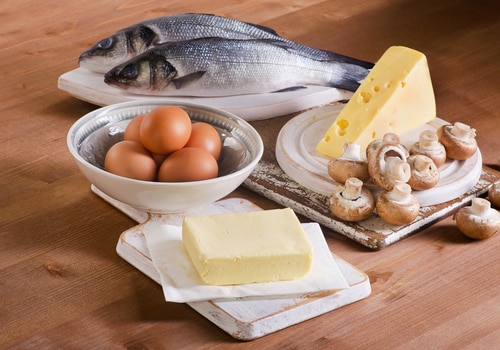

Fish and seafood
Fish and other seafood can be excellent sources of vitamin D, but it is important to choose the right type.
This can be quite difficult as vitamin D levels vary considerably between species, whether the fish is wild or farmed and how you cook it.
Oily fish
Fish store large quantities of vitamin D in their liver and fat tissues, making oily or fatty fish a great source of dietary vitamin D.
Salmon is one of the best vitamin D sources, containing 668 IU per 100g, on average.7 Wild salmon is particularly rich in vitamin D – in one study, wild salmon had 75% more vitamin D than farmed salmon.8
Tuna
Tins of tuna are convenient, versatile, and cost-effective. They are also a great source of dietary Vitamin D. Tinned light tuna contains around 236 IU of Vitamin D per 100g. That is more than half your recommended daily intake.
If you want to push the boat out a little, a wild-caught tuna steak can be even higher in vitamin D – if you are going to treat yourself with anything, it may as well be with some high-quality vitamin D!
Oysters
Okay, so oysters are not an everyday ingredient, but did you know that they contain 320 IU of Vitamin D per 100g? So the next time you get to indulge in such a luxury, know you are supporting your body’s levels of vitamin D at the same time.
More fish high in vitamin D:
- Trout
- Sardines
- Mackerel
- Herring
Top Tip: Bake or steam your fish without added fat e.g. oil and butter, to keep as much vitamin D inside as possible. Vitamin D is fat-soluble, so if you fry fish in oil or other fats then some of the vitamin will escape into the cooking oil.
Cod liver oil
Don’t really enjoy eating fish? Choose a quality cod liver oil supplement to get the Vitamin D benefits of oily fish. One teaspoon will give you around 450 IU of Vitamin D, making it a great natural supplement to take all year round.
Remember: Oily fish is rich in vitamin D and other nutrients, but it can also contain contaminants such as mercury. In 2004, the UK government advised that girls and women of child-bearing age should limit their oily fish intake to two portions a week.9
Tofu
Tofu is not just for vegetarians and vegans! It is a highly versatile source of dietary Vitamin D which you can use for snacks, lunches, and main meals.
There are a few different types you will come across, so here is our advice about how to best use them.
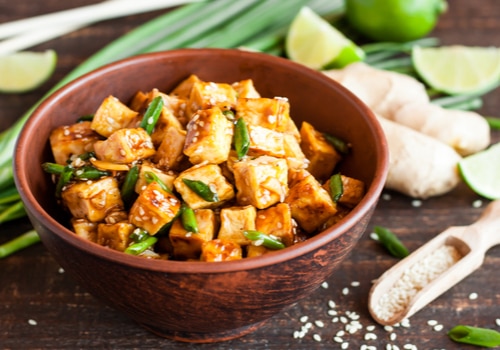

Silken / Japanese-style tofu: Silky and creamy, this can be used as a thick cream, to make a vegan cheesecake, put in smoothies or even make creamy dips with.
Regular tofu: It is soft like silken, but a little more compact. This type of tofu soaks up flavours of stocks and sauces – it is usually used in noodle soups. Try making vegan scrambled eggs with it, just sprinkle in some turmeric and black Himalayan salt.
Firm tofu: Perhaps the most common tofu, firm tofu usually comes soaked in liquid. The texture will be like feta cheese.
Before use, dry it before using it by pressing it (placing it on a plate in the sink and putting something heavy on it works too! Then let it soak in a marinade for at least an hour. Finally, pan-fry, stir-fry, deep-fry or bake it in a yummy sauce in the oven.10
Plant-based dairy alternatives
Soya Milk
Most dietary Vitamin D is found in animal products. So fortified food sources of vitamin D are particularly useful for vegans and vegetarians. Soya milk contains around 100-120 IU in one cup and lots of protein. Try using it in your morning smoothie or cereal to start your day off right.
Almond Milk
200ml of almond milk contains around 90 IU of Vitamin D. Check the label of your favourite brand to see how much Vitamin D you will get per serving.
Fortified vegan yoghurt
Similar to plant-based milks, vegan yoghurts also know their target market may be lacking in vitamin D in the winter, so a lot of them fortify their products with vitamin D. Try topping it with granola and honey or agave nectar.
Did you know? In the UK, cows’ milk is generally not a good source of vitamin D as it is not fortified like it is in other countries. Stick to the plant milks if you want to increase your dietary vitamin D.11
Orange juice
Get some Vitamin D from fortified orange juice, which can contain up to 140 IU of Vitamin D per glass.
Fortified breakfast cereal
Some healthy breakfast cereals and instant oats are fortified with Vitamin D. Check the label for the amount per serving.
Meat substitutes
There are tons of meat substitutes on the market – and some are pretty realistic – adding to their authenticity is the fact they are usually fortified with vitamin D.
Real meat can be a bit hit and miss when it comes to vitamin D, with red meat, liver and other offal being the best sources. At least with fortified faux-meat, you know it contains the vitamin D you need.
Try going meat-free for a few of your meals and swap it for fortified plant-based mince, burgers, nuggets, goujons, chunks or even steak! Check the nutritional label to see if has been fortified and tuck in.
Summary
- Vitamin D can be sourced via a number of different foods, including fish, seafood and red meat.
- Non-meat alternatives include tofu, mushrooms, orange juice and fortified vegetarian and vegan products.
Vegan and vegetarian sources of vitamin D
It's important we're all mindful of our vitamin D levels, especially if we have limited access to the sun. However, with vitamin D only being present in a small amount of food, it's important that those following a vegan or vegetarian diet aren't cutting out vitamin D-rich food.
What vegan foods are high in vitamin D?
Here are some examples of some of the main vegan sources of vitamin D12:
| Food | Amount | Amount of Vitamin D (IU) |
| Almond milk, original, fortified with vitamin D | 1 cup | 100 |
| Portobello mushrooms (also maitake, morel, button and shiitake mushrooms) |
1 cup, sliced | 634 |
| Orange juice, fortified with vitamin D | 1 cup | 100 |
| Soy yoghurt, fortified with vitamin D | 150 g | 80 |
| Cereal, fortified with vitamin D | 3/4 to 1 cup | 40 |
| Tofu, fortified with vitamin D | 18g | 139 |
| Soy milk, fortified with vitamin D | 1 cup | 107 - 117 |
The top 10 sources of vitamin D for vegans
1. Mushrooms
2. Fortified tofu
3. Fortified soy milk
4. Fortified almond milk
5. Fortified rice milk
6. Fortified orange juice
7. Soy yoghurt
8. Fortified breakfast cereal
9. Vegan vitamin D supplements
10. Sunshine!
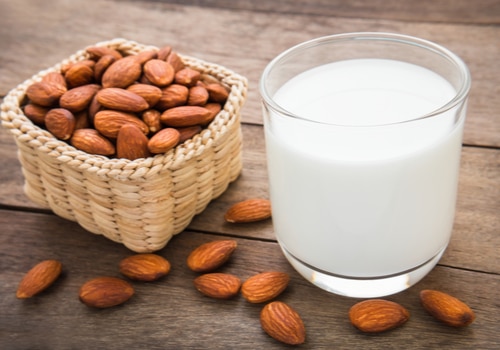

Which vegan food contains the most vitamin D?
So, we’ve shared the main Vitamin D food sources with you above, but if you don’t want to eat them all, and had to just eat and drink a selection of them, which ones would be the best ones to choose? Without a doubt, it’s got to be the following vegan Vitamin D food sources, purely because of their high Vitamin D content (some natural and some fortified).
1. Mushrooms
Mushrooms are one of the only plant source of Vitamin D (apart from fortified foods).
They can synthesise Vitamin D when they are exposed to UV light, just like we can.
Choose wild mushrooms or mushrooms grown in UV light.
While they may grow in the dark, exposing them to sunlight boosts their vitamin D levels and means they can contain up to 450 IU per 100g serving!
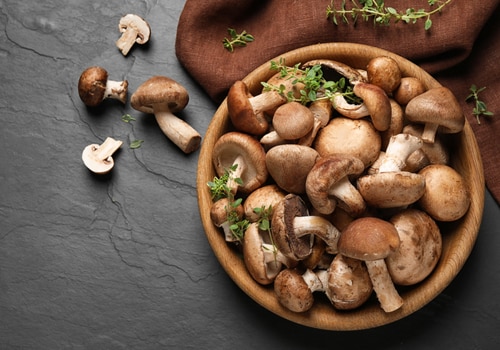

Top tip: Slice up some mushrooms and leave them exposed to the sun outside from 10 am – 4pm on a sunny day on 2 separate occasions, e.g. Monday is bright, Tuesday is dull and Wednesday is sunny again, so you’d put the mushrooms out in the sun on Monday and Wednesday. Cook and enjoy!
Or, you can dry them thoroughly (e.g. using a food dehydrator) add to a jar with 1 tablespoon of uncooked rice, and store for a later day. Just rehydrate them in water 1 hour before you want to cook with them.13
2. Fortified tofu
A one-fifth block of fortified raw tofu contains 120 IU of Vitamin D, which also happens to be a good protein source for vegans too. Other tofu and soy foods high in Vitamin D are light silken tofu (21%), sprouted tofu and extra firm tofu and firm tofu (14%).14
3. Fortified soy milk
The level of Vitamin D can vary, depending on the brand of soy milk you buy, but on the whole, fortified soy is seen as being an excellent, non-dairy Vitamin D source for vegans. Around 100ml of soy milk contains in the region of 32 IU of Vitamin D.15
A final few words about vegan vitamin D...
Vitamin D is something we can all be lacking in, not just vegans, particularly during the winter months when the sun doesn’t shine as much and our bodies aren’t making valuable Vitamin D from its UV rays.
But all is not lost, because there are several vegan Vitamin D food sources out there, as well as vegan supplements, that can be incorporated into your diet to make sure you’re getting enough of this vitamin in your system all-year-round.
Vitamin D isn’t the only nutrient vegans can be lacking in. Due to the fact that the vegan diet doesn’t contain any animal-derived dairy products, it’s not uncommon for calcium levels among people who follow a vegan diet to be low. Fortunately, as with Vitamin D, there are vegan-approved calcium alternatives out there. This article explores what they are, ‘6 of the best vegan calcium sources.’
What vegetarian foods are high in vitamin D?
Here are examples of some of the main vegetarian sources of vitamin D16:
| Food | Amount | Amount of Vitamin D (IU) |
|
Low fat cow’s milk, fortified with Vitamin D |
1 cup | 127 |
| Yoghurt, fortified with Vitamin D | 6 ounces | 80 |
|
Egg yolks |
Yolk from 1 medium egg | 41 |
| Swiss cheese | 1 ounce | 6 |
| Cod liver oil | 4.9ml | 448 |
Vegetarian sources of vitamin D
1. Mushrooms
2. Cod liver oil
3. Egg yolk
4. Cheese
5. Fortified tofu
6. Fortified cow’s milk
7. Fortified yoghurt
8. Fortified breakfast cereal
9. Fortified orange juice
10. Plant milk – soya, rice, hemp, oat and almond milk
11. Margarine
12. Vegetarian Vitamin D supplements
13. Sunshine!
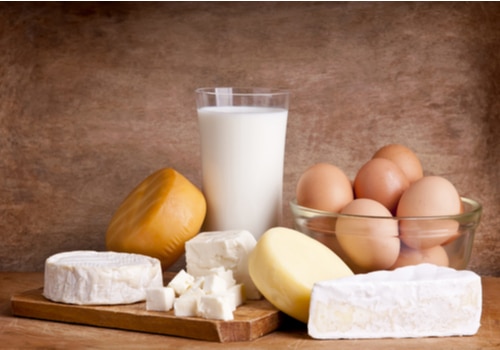

What kind of vegetable has vitamin D?
Several different vegetables contain Vitamin D. They tend to be dark leafy veg, and include spinach kale, okra and collards.19
Is broccoli high in Vitamin D?
No, broccoli isn’t a Vitamin D food source. However, it has been recognised as being a great source of calcium, which goes hand-in-hand with Vitamin D. Vitamin D and calcium helps keep bones strong and can help prevent osteoporosis.20
Other vital vitamins and supplements for non-meat eaters
-
Vitamin B12
Vitamin B12 plays a key role in enabling our brain to function and our blood to flow through our bodies and is mainly found in animal products, which aren’t found in vegetarian diets.
-
Zinc
Zinc is responsible for regulating the body’s immune system. However, it’s only present in a few plant-based foods.
-
Iron
Iron transports oxygen around our blood, which helps fuel our energy levels. The body absorbs two to three times more iron from animal sources than plant sources.
-
Omega 3
Omega 3 important for brain and eye function. It can be found in fish – especially fatty fish, such as salmon and tuna – so if you’re a vegetarian who happens to still eat fish (i.e. a pescitarian), then you should hopefully be getting your quota of fatty acids.
-
Calcium
Calcium helps to keep our bones strong and the main source of it tends to be dairy. Plant-based sources of calcium include kale, broccoli, chickpeas, soybeans, almonds and bok choy. It’s also advisable for vegetarians to take a daily calcium supplement.
-
Protein
Protein tends to mainly be linked to meat however, if you don’t eat meat you can get your protein through plant-based protein sources, of which there are many. They include tofu, lentils, seeds and whole grains.
-
Vitamin B2
Vitamin B2 (also known as Riboflavin) is responsible for helping convert our food into energy. Being deficient in it can lead to low energy levels and digestive problems. This nutrient is mainly found in animal proteins, but it can be found in several plant-based sources, including almonds, spinach and mushrooms.
Meal ideas using food rich in vitamin D
Breakfast choices
Make smart choices at breakfast to increase your Vitamin D. Whole eggs and oily fish are great sources. Scrambled egg or tofu with wild smoked salmon or mushrooms, anyone?
Or choose a breakfast cereal or instant oats brand fortified with Vitamin D3 made with plant milk.
Pour yourself a glass of orange juice to have on the side and you have one vitamin-D rich breakfast at your fingertips!
Lunchtime
Tinned tuna is a good source of dietary Vitamin D and is a convenient choice for lunch on-the-go. Try it as a topping for a jacket potato, or as part of a healthy salad.
Vegetarian or vegan? Substitute the tuna for a plant-based meat alternative or crispy tofu – mmm!
What’s for dinner?
Add some Vitamin D sources to your evening meal. Choosing oily fish such as wild salmon and wild-grown mushrooms, both of which are great in a risotto – maybe you could make a creamy sauce with fortified soya milk or plant-based cream to add even more vitamin D to your meal?
Taking a vitamin D supplement
As well as upping your Vitamin D food sources, it is also possible to boost your levels by taking vitamin D supplements.
There’s a wide range of supplements out there, such as tablets, caplets, drops for babies and children, sprays and chewable tablets.
Take a daily Vitamin D supplement to cover your everyday dose of Vitamins D2 and D3. It’s a cost-effective way to get peace of mind all year round.
Here’s our Vitamin D guide to make sure you take the one that is right for you and your family members.
Vitamin D surprising facts
Here are a few things you might not have known about Vitamin D, until now:
- You are more likely to get less of it if you live in a city, which is built up and where pollution levels are higher, or if you work in an office or on night shifts.21
- In the UK, one in five people have low Vitamin D levels.22
- Most people do not realise they have a Vitamin D deficiency.23
- During the autumn and winter, you need to get vitamin D from your diet because the sun is not strong enough for our bodies to make it.24
- The ultraviolet B that is in sunlight and enables our body to generate Vitamin D does not penetrate glass, so you need to go outside to get your UV-Vitamin D hit.25
We recommend...
- https://www.nhs.uk/conditions/vitamins-and-minerals/vitamin-d/
- https://www.nhs.uk/news/food-and-diet/the-new-guidelines-on-vitamin-d-what-you-need-to-know/
- https://oldwayspt.org/blog/vitamin-d-sources-vegans-and-vegetarians
- https://www.nhs.uk/live-well/healthy-body/how-to-get-vitamin-d-from-sunlight/
- https://www.nhs.uk/conditions/vitamins-and-minerals/vitamin-d/
- https://www.nhs.uk/conditions/vitamins-and-minerals/vitamin-d/
- https://www.myfooddata.com/articles/high-vitamin-D-foods.php
- https://www.ncbi.nlm.nih.gov/pmc/articles/PMC2698592/
- https://www.bbc.co.uk/programmes/articles/4mbCTBjhnt8VLmMKwQz3RrS/the-big-vitamin-d-experiment
- http://www.tofupedia.com/en/tofu-bereiden/soorten-tofu/
- https://www.nhs.uk/conditions/vitamins-and-minerals/vitamin-d/
- https://oldwayspt.org/blog/vitamin-d-sources-vegans-and-vegetarians
- https://fungi.com/blogs/articles/place-mushrooms-in-sunlight-to-get-your-vitamin-d
- https://www.theactivetimes.com/healthy-living/15-foods-highest-amounts-vitamin-d/slide-14
- https://www.theactivetimes.com/healthy-living/15-foods-highest-amounts-vitamin-d/slide-11
- https://oldwayspt.org/blog/vitamin-d-sources-vegans-and-vegetarians
- https://www.healthline.com/nutrition/vitamin-d-foods-for-vegetarians#3.-Egg-yolks
- https://vegsoc.org/info-hub/health-and-nutrition/vitamin-d/
- https://www.webmd.com/food-recipes/guide/calcium-vitamin-d-foods
- https://www.freshly.com/blog/articles/broccoli-nutrition-and-health-benefits#:~:text=While%20broccoli%20does%20not%20have,can%20help%20to%20prevent%20osteoporosis/
- https://www.getthegloss.com/article/10-things-you-may-not-know-about-vitamin-d
- https://www.nutrition.org.uk/nutritioninthenews/new-reports/983-newvitamind.html?
- https://www.healthline.com/nutrition/vitamin-d-deficiency-symptoms
- https://www.nhs.uk/conditions/vitamins-and-minerals/vitamin-d/
- https://www.nhs.uk/news/lifestyle-and-exercise/news-analysis-health-claims-about-vitamin-d-examined/

Nutritionist
Joined Holland & Barrett: January 2018
Bsc in Nutrition, Registered Associate Nutritionist and Certification in Pre and Post Natal Nutrition
Donia started her career as a freelance nutritionist, later she joined Nestle as their Market Nutritionist to help support their healthier product range, before joining the team at Holland & Barrett in January 2018.
Donia has over 6 years experience as a Nutritionist and also works with clients on a one to one basis to support their goals which include weight loss, prenatal and postnatal nutrition and children’s health.
